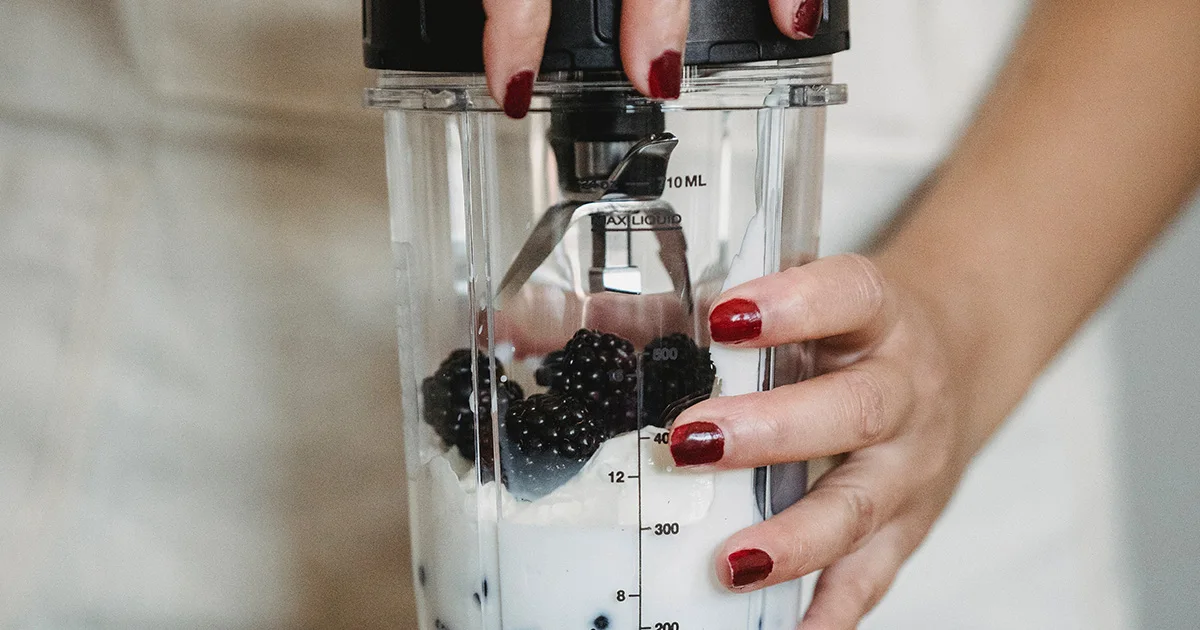Here's what we'll cover
Here's what we'll cover
You’ve heard that whole grains are good for your health, but what about weight loss? Can a daily bowl of oatmeal help you shed extra pounds?
It just might! We’ll dive into exactly how below.
Oatmeal for weight loss
Some manufacturers market oatmeal as a superfood that can help you lose weight. It may not be quite so simple as that, but oatmeal has a strong case to be part of almost any healthy diet.
Much of the hype about oatmeal revolves around beta-glucans. Beta-glucans are a type of soluble fiber found in oats and barley. Research has shown oat beta-glucans (OBGs) can help reduce the post-meal glucose response (Henrion, 2019). That’s a way of saying they don’t spike blood sugar levels the way other carbohydrates can.
How do OBGs do this?
In simple terms, these dietary fibers have a particular viscosity that makes them slower to digest. Because the carbs don’t break down into sugars as quickly, it takes more time for those sugars to get to the bloodstream (Henrion, 2019).
High post-meal blood sugar is temporary. It triggers an increase in insulin levels as a response, and the crash that follows can arrive with an intense sense of hunger (Bell, 2003). Hunger can lead to snacking, and snacking can lead to weight gain. A bowl of oatmeal in the morning could help curb those “hangry” pre-lunch feelings some people get. The sense of satiety (fullness) one gets from oats may last longer than from an equal quantity of ready-to-eat cereal (Rebello, 2015).
Cholesterol-lowering effects
Another health benefit of beta-glucans is their cholesterol-lowering effect (Whitehead, 2014). This benefit isn’t immediate, like their impact on blood glucose, but a slow change over a period of weeks.
In multiple studies, subjects who ate more than 3 grams of OBGs per day saw a significant lowering of both total and LDL (“bad”) cholesterol. Another point in oatmeal’s favor was that it did this without affecting HDL (“good”) cholesterol levels. This is great news, as high LDL cholesterol can signify heart disease, type 2 diabetes, and high blood pressure, among other severe health problems (Narwal, 2019).
How much oatmeal makes 3 grams of OBGs? A good rule of thumb is that dry oats are around 4.5% OBG (Henrion, 2019). So about 67 grams of oatmeal would deliver it. That’s around ¾ cup, depending on the style of oats you’re using. If you want to be exact, a small digital scale is a convenient kitchen item.
Ways to eat oats
Whole grain oats are a low-fat, low-calorie breakfast option. And you can find certified gluten-free oats if you’re staying away from gluten. Using the most famous brand as a baseline, 70 grams (enough to get 3 grams of OBGs with a little wiggle room) would also provide 8.8 grams of protein and 7 grams of fiber. And oats are relatively high in phosphorus, magnesium, and potassium (USDA, n.d.)
If it seems like too large a portion, there are other ways to get OBGs. Research has shown similar cholesterol-lowering benefits from drinking oat milk (Onning, 1999).
The nutritional value is mostly the same regardless of the type of whole oats one eats. Whether you choose steel-cut oats, Irish oats, rolled oats, or old-fashioned oats, the differences are negligible. Where things get dicey is instant oats. Instant oatmeal could be made from nothing but oats. Still, it’s often packaged with flavorings, sweeteners, stabilizers, and other undesirable additions. To make sure there aren’t added ingredients that might derail your health goals, make sure to check that there’s only one: oats.
Adding too many sweeteners to your oatmeal can undo many of the positive benefits of oats. You may have heard that various sugar sources are different. But in the end, sugar is sugar. Whether you get it from white sugar, brown sugar, maple syrup, honey, or high-fructose corn syrup isn’t relevant. Consuming sugar in any form will spike your blood glucose (Raatz, 2015).
What about overnight oats?
How you prepare your oats can make a difference. Overnight oats are simple to make by adding raw oats to cold water and letting them sit. You can make them in bulk, store them in the refrigerator, and add them to dishes over a few days. However, note that animal studies have shown boiled oats have a higher soluble beta-glucan content than overnight oats (Ban, 2015).
Still, overnight oats are handy to have around. You can heat them quickly for a traditional breakfast or toss them cold in a salad for extra fiber. Soaking in another liquid, like unsweetened almond milk, can add some extra flavor and boost the nutritional value.
Oats aren’t only for a healthy breakfast. The people of Scotland have known for centuries that oats make a great dinner. While you may or may not wish to make your own haggis or black pudding, a savory porridge with sauteed veggies can be a great side dish. Using bone broth instead of water to cook them will amp up the savoriness.
The oatmeal diet
Because it’s well known that oats are good for you, it was inevitable that someone would come up with a fad oatmeal diet. Here’s what it is in a nutshell: eat oatmeal for three meals a day for a week, then eat oatmeal for one or two meals a day after that. Some fruit, milk, and yogurt are allowed with the oats.
Oatmeal diets have been studied as a therapy for people with diabetes and have shown great promise. However, these are short-term treatments of two days for patients with uncontrolled glucose levels (Lammert, 2008).
Extreme diets can be extremely dangerous. One cannot get all the nutrients one needs from oatmeal and a bit of fruit. Going a week without necessary nutrition is never a good idea.
There is no magic diet where one ingredient alone will help you control your weight. The road to weight loss is a healthy, balanced diet and regular exercise. If you want or need to lose weight, talk to your healthcare provider or a dietitian. They’ll be able to guide you to a balanced meal plan that’s right for your nutritional needs. Oatmeal might even be a big part of it. Just not for every meal.
DISCLAIMER
If you have any medical questions or concerns, please talk to your healthcare provider. The articles on Health Guide are underpinned by peer-reviewed research and information drawn from medical societies and governmental agencies. However, they are not a substitute for professional medical advice, diagnosis, or treatment.
Ban, Y., Qiu, J., Ren, C., & Li, Z. (2015). Effects of different cooking methods of oatmeal on preventing the diet-induced increase of cholesterol level in hypercholesterolemic rats. Lipids in Health and Disease, 14 , 135. doi: 10.1186/s12944-015-0138-7. Retrieved from https://pubmed.ncbi.nlm.nih.gov/26498197/
Bell, S. J., & Sears, B. (2003). Low-glycemic-load diets: Impact on obesity and chronic diseases. Critical Reviews in Food Science and Nutrition, 43 (4), 357–377. doi: 10.1080/10408690390826554. Retrieved from https://pubmed.ncbi.nlm.nih.gov/12940416/
Henrion, M., Francey, C., Lê, K.-A., & Lamothe, L. (2019). Cereal b-glucans: The impact of processing and how it affects physiological responses. Nutrients, 11 (8). doi: 10.3390/nu11081729. Retrieved from https://pubmed.ncbi.nlm.nih.gov/31357461/
Lammert, A., Kratzsch, J., Selhorst, J., Humpert, P. M., Bierhaus, A., Birck, R., et al. (2008). Clinical benefit of a short term dietary oatmeal intervention in patients with type 2 diabetes and severe insulin resistance: A pilot study. Experimental and Clinical Endocrinology & Diabetes: Official Journal, German Society of Endocrinology [and] German Diabetes Association, 116 (2), 132–134. doi: 10.1055/s-2007-984456. Retrieved from https://pubmed.ncbi.nlm.nih.gov/18095234/
Narwal, V., Deswal, R., Batra, B., Kalra, V., Hooda, R., Sharma, M., & Rana, J. S. (2019). Cholesterol biosensors: A review. Steroids, 143 , 6–17. doi: 10.1016/j.steroids.2018.12.003. Retrieved from https://pubmed.ncbi.nlm.nih.gov/30543816/
Onning, G., Wallmark, A., Persson, M., Akesson, B., Elmståhl, S., & Oste, R. (1999). Consumption of oat milk for 5 weeks lowers serum cholesterol and LDL cholesterol in free-living men with moderate hypercholesterolemia. Annals of Nutrition & Metabolism, 43 (5), 301–309. doi: 10.1159/000012798. Retrieved from https://pubmed.ncbi.nlm.nih.gov/10749030/
Raatz, S. K., Johnson, L. K., & Picklo, M. J. (2015). Consumption of honey, sucrose, and high-fructose corn syrup produces similar metabolic effects in glucose-tolerant and -intolerant individuals. The Journal of Nutrition, 145 (10), 2265–2272. doi: 10.3945/jn.115.218016. Retrieved from https://pubmed.ncbi.nlm.nih.gov/26338891/
Rebello, C. J., Johnson, W. D., Martin, C. K., Han, H., Chu, Y.-F., Bordenave, N., et al. (2016). Instant oatmeal increases satiety and reduces energy intake compared to a ready-to-eat oat-based breakfast cereal: A randomized crossover trial. Journal of the American College of Nutrition, 35 (1), 41–49. doi: 10.1080/07315724.2015.1032442. Retrieved from https://pubmed.ncbi.nlm.nih.gov/26273900/
Stuckel, J. G., & Low, N. H. (1996). The chemical composition of 80 pure maple syrup samples produced in North America. Food Research International, 29 (3), 373–379. doi: 10.1016/0963-9969(96)00000-2. Retrieved from https://www.sciencedirect.com/science/article/abs/pii/0963996996000002
U.S. Department of Agriculture (USDA) (n.d.) FoodData Central: Quaker Old Fashioned Oats 42Oz. Retrieved March 9, 2021, from https://fdc.nal.usda.gov/fdc-app.html#/food-details/1164193/nutrients
Whitehead, A., Beck, E. J., Tosh, S., & Wolever, T. M. S. (2014). Cholesterol-lowering effects of oat β-glucan: A meta-analysis of randomized controlled trials. The American Journal of Clinical Nutrition, 100 (6), 1413–1421. doi: 10.3945/ajcn.114.086108. Retrieved from https://pubmed.ncbi.nlm.nih.gov/25411276/










